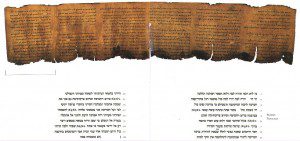 I had the opportunity last fall to meet Amy Julia Becker at a BioLogos gathering. Amy Julia is author of a number of books, most recently Small Talk: Learning From My Children About What Matters Most. She has a blog Thin Places that touches on a number of different issues. She commented on her experience at the BioLogos meeting in a post last October, Are Faith and Science Compatible? Hanging out with Christian scientists taught me even more about the nature of God. I’ve continued to read her blog on occasion, finding it something of a change from my usual more academic fare, and often quite thought provoking. And this brings me to the point of the current post. (Image – Psalms Scroll)
I had the opportunity last fall to meet Amy Julia Becker at a BioLogos gathering. Amy Julia is author of a number of books, most recently Small Talk: Learning From My Children About What Matters Most. She has a blog Thin Places that touches on a number of different issues. She commented on her experience at the BioLogos meeting in a post last October, Are Faith and Science Compatible? Hanging out with Christian scientists taught me even more about the nature of God. I’ve continued to read her blog on occasion, finding it something of a change from my usual more academic fare, and often quite thought provoking. And this brings me to the point of the current post. (Image – Psalms Scroll)
Earlier this month Becker put up a post worth some discussion: Why You Don’t Need to Read the Whole Bible. Not surprisingly the post drew some attention, especially on Christianity Today where her blog is hosted. Her point is straightforward – and makes sense. To set up this post I’ll clip just a little – fleshed out much more completely at the link above.
I’ve read through the Bible before, and I suspect I will do it again. I consider the Bible the Word of God, inspired by God and authoritative in my life and in our world.
And yet I also wonder about the helpfulness of reading the Bible in its entirety. Plenty of people admit to falling off the wagon, so to speak, when they get to Leviticus (the third book of the Old Testament), and plenty more get tripped up by the warfare and sacrifices throughout, but my concerns about this type of Bible reading go deeper than the practical problems some of our ancient Scriptures pose.
She gives four reasons why reading the whole Bible may not be necessary or productive:
First of all, reading the Bible is not something to check off a bucket list.
The second reason not to read the Bible cover to cover is gracious realism.
Third, the Bible was written to be read in community.
Finally, although the Bible can (and should) be read as a whole, certain books within it are more accessible and more foundational than others.
And a conclusion.
So if you are already familiar with the Bible and you want to read it cover to cover because you want a deeper understanding of God’s work throughout history and in your life, go for it. But if you want to read the Bible cover to cover in order to check it off a list and feel proud of yourself, you might want to set a different goal. And if you are new to the Bible but want to engage these texts that have been foundational for faith and life for billions of people throughout centuries, pick and choose—ideally in community—based upon the texts that tell the foundational story.
 I’ve been thinking of this post off and on over the last several weeks. Certainly reading the bible through is not something to be checked off a bucket list. Nor is it an achievement that necessarily makes for more godly Christians.
I’ve been thinking of this post off and on over the last several weeks. Certainly reading the bible through is not something to be checked off a bucket list. Nor is it an achievement that necessarily makes for more godly Christians.
There are parts of the Bible that are clearly less significant and harder to read than others – parts of Exodus, Leviticus, Numbers, and Deuteronomy are rather tedious. Do we really need to read through all those details of the tabernacle, all those laws (it is a defiling skin disease? say what?) and names and divisions and numbers? The first eight chapters of 1 Chronicles and the end of Ezekiel are tough slogs as well – for not much insight gained. And in the New Testament, parts of Revelation are rather impenetrable.
Salvation is not dependent on a thorough understanding and reading of all of scripture. We can grow in knowledge and love of God through other means as well. And the Bible is undoubtedly written to be read and heard in community.
And yet …
Yet I think we are often too quick to dismiss the importance of regular reading of the Bible – including the harder passages and the rather obscure lists and laws. Bible reading in general, even in the church, isn’t valued as it once was. And it is particularly unfortunate when those who teach and lead find it expedient to stick only to the high points rather than cultivate a discipline of reading or listening to the entirety of scripture on a regular basis.
What have I learned from developing a discipline of taking in the whole bible – not in diligent and deep study, but in reading or listening to the whole?
 First, and most important, the Gospels contain so many quotes and allusions to the prophets that any reading of these without a knowledge of the prophets misses much of the meaning and intent. Zephaniah, Hosea, Isaiah, Jonah, and more. In the church from the cradle, growing up in a church that emphasized the Bible, I was still amazed at how much I had missed. My understanding of the Gospels (not to mention Paul) increased substantially (and changed slightly) once I broke down and listened to the prophets through … more than once.
First, and most important, the Gospels contain so many quotes and allusions to the prophets that any reading of these without a knowledge of the prophets misses much of the meaning and intent. Zephaniah, Hosea, Isaiah, Jonah, and more. In the church from the cradle, growing up in a church that emphasized the Bible, I was still amazed at how much I had missed. My understanding of the Gospels (not to mention Paul) increased substantially (and changed slightly) once I broke down and listened to the prophets through … more than once.
Second, it became much harder to let a theory of scripture rule my thinking. Scripture doesn’t fit into many of the molds we want to force it into. Yet if we take it as inspired and foundational we need to let Scripture be our primary guide in the reading of Scripture.
Third, the story of the Old Testament – and God’s patience and faithfulness – is powerful. So is the great commandment to love God with heart and strength and soul and to love others as ourselves. It is impossible to reduce the Old Testament to a series of stories with moral lessons for twenty first century life when immersed in the story as a whole. No, the story of Shadrach, Meshach, and Abednego is not told in Daniel to provide us with inspiration for dealing with marital and financial problems today, despite the message in one sermon I heard a few years ago. Being immersed in the whole of Scripture helps to protect us from such errors.
Fourth, I am particularly interested in the relationship between modern science, our secular culture, and the Christian faith. I have found that a more complete understanding of Scripture has helped to put many of these concerns in proper perspective. The literalist approach, including a six-day creation reading, may make sense in bits and pieces, but requires so many caveats and twists to make consistent with the whole that it seems clear that this isn’t the best way to be faithful to the message of Scripture. Likewise the secular arguments against the bible make far less sense when immersed in the sweep of the biblical story. I find it easier to find the real conflicts, rather than being caught up in less significant detail.
Fifth, it becomes apparent that the sound bite gospel is not consistent with the whole of scripture. It isn’t wrong, but it also leaves out too much to be considered truly right. God’s relation with his people is far more nuanced and complex than a simple depraved sinner – salvation – heaven story allows.
I could probably come up with more, but this is enough for now.
Reading the Bible through is not something to check off a bucket list. And no, it is not necessary for every Christian in every situation. And it is important that we do it in community – each individual interpretation is not equally valid. But if we as a church are not immersed in the entire sweep of scripture we miss something important. And if our leaders and teachers are not reading the whole of scripture we will suffer the loss.
What do you think? Is it important to read the entire Bible?
Why or why not? If not what books or passages do you find particularly foundational?
What would you recommend for a new Christian?
For someone interested in teaching and leading?
If you wish to contact me directly you may do so at rjs4mail [at] att.net.
If interested you can subscribe to a full text feed of my posts at Musings on Science and Theology.











